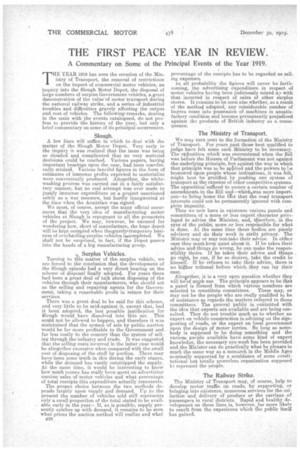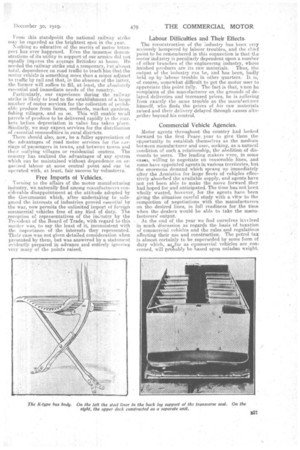THE FIRST PEACE YEAR IN REVIEW.
Page 8

Page 9

If you've noticed an error in this article please click here to report it so we can fix it.
A Commentary on Some of the Principal Events of the Year 1919.
THE YEAR lala has seen the creation of the Ministry of Transport, the removal of restrictions on the import of commercial Motor vehiclea, an inquiry, into the Slough Motor Depot, the disposal of large numbers of surplus Government vehicles, a great demonstration of the value of motor transport during the national railway strike, and a series of industrial troubles and difficulties gravely affecting the output and cost of vehicles. The following remarks, dealing in the main with the events catalogued, do not profess to provide the history of the year, but only a brief commentary on some of its principal occurrences.
Slough. ..
A few lines will suffice in which to deal with the matter of the Slough Motor Depot -Very early in the inquiry it was realized that the issue was being so clouded and ,complicated that no very material decisions could be reached. • Viericrus papers, having important bearings upon the ease, had been conveniently mislaid. Various fanciful figures in the form of estimates of immense profits expected to materialize were conveniently produced. Altogether, the whitewashing process was carried out in a fairly satisfactory manner, but no real attempt was ever made to jestify immense expenditure on a project sanctioned solely asa. war measure, but hardly inaugurated at the time When the Armistke was, signed.
We must, of course, accept the many official assurances that the very idea of manufacturing motor vehicles at Slough is repugnant to all the promoters of the project We may, however, be excused for wondering how, short of nianufa.oture, the huge depot will be kept occupied when theipurelptemporary business of oveihauling surplus vehicles isaeornpleteci. We shall not be surprised, in fact, if the Depot passes into the hands of a big manufacturing group. .
.. Surplus Vehicles. , .
Turning to this matter of the.stuplus vehicle, we are forced to the conclusion that the development of the Slough episode had a very direct bearing on the scheme of disposal :finally adopted. For years there had be-en •a great deal of talk about disposing of the vehicles through their manufacturers, who should act as the selling and repairing agents for the Government., taking a reasonable profit in return for their services.
There was a great deal to be said for this scheme, and very little. to be said against it, except that, had it been adopted, the last possible justification for Slough would have dissolved into thin air, This could not be allowed to happen, and therefore it was maintained that the system of sale by public auction would be far more profitable to the Government andfar less costly to the country than the system of selling through the industry and trade. It was suggested that the -selling eosts incurred in the latter case. would be altogether excessive when compared with the small cost of disposing of. the stuff by auction. There may have-been some truth in this during the early stages, while the demand has vastly outstripped the supply. At the same time, it:would be interesting to know how Much igioney has really been spent on advertising! auction 'sales of motor vehicles and what percentage of total receipts this expenditure actually represents.
The -proper choice between the two methods depends largely upon supply and demand. Tip to the present the number of vehicles sold still represents only a small proportion of the total stated to be available early in the year.-If, as is possible, supply presently 'catches up with demand, it remains to be seen what prices the auction method will realize and what percentage of the receipts has to be regarded as sell-. ing expenses.
In all probability the figures will never be forthcoming, the advertising expenditure in respect of motor vehicles having been judiciously mixed up with that incurred in. respect of sales of other surplus stores. It remains to be seen also whether, as a result of the method adopted, any considerable number of buyers come into pas:session of machines in unsatise factory condition and become permanently prejudiced against the products of British industry as a consequence.
The Ministry of Transport.
We may turn next to the formation of the Ministry of Transport. For years past those best qualified to judge have felt some such Ministry to be necessary. . The opt)osition which was encountered when the Bill was before the Houses of Parliament was not against the underlying principle, but against the way in which that principle was to be aadied and the powers to Le bestowed upon people whose inclinations, it was felt, might best be gratified by pushing one system of transport at the expense of other competitive systems. The oppouitiodsuffieed to secure a certain number of amendments in the Bill and—whiclowas more important—to 'bring home the fgat that the road transport interests could neot be permanently ignored with complete impunity.
Thus we now have in existence various panels and committees of a more or less expert character privileged to advise the Minister, and, therefore, in the eyes of the public, more or less respginsible for what is done. At the same time these bodies are purely advisory and do their work in stria privacy. The Minister may or may not-take their advice. In either ease they mustikeep quiet about it. If he takes their advice and things go wrong, he can make the 'responsibility theirs. If he takes their advice and things go right, he can, if he so desires, take the credit to himself. if he refuses to take their advice, there is no higher tribunal before which they can lay their ease.
Altorther, it is a very open question whether they will be.of mIch use. The principle appears to be that a panel is formed from which various members are selected to constitute committees. These may, or may not be the people who are .really qualified to be of assistance as regards the matters referred to those committees.' The general public is aociteeted with the idea that experts are available and are being consulted. They do not trouble much as to whether an expert on vehicle construction is advising -on the signposting of roads, or the expert on local government upon the design of motor lorries: So long as somebody is supposed to be doing something and the various peeple available have some kind of expert knowledge, the necessary eye-wash has been provided and the Minister can do practically what he pleases in much the same way as a monarch, in the Middle Agee nominally supported by a semblance of some constitutional but totally powerless organization supposed represent the people.
The Railway Strike:
The Ministry of Transport may, of course, help to develop motor, traffic on roads, by supporting, or bringing into existence, numerous services for the collection and delivery of produce or the carriage,of passengers in rural districts. Rapid and healthy development on these lines is, however, far more likely to result from the experience Which ale public itaelf has gained,
From this standpoint the national railWay strike may be regarded as the brightest spot in the year.
:Nothing so educative of the merits of motor transport has ever happened. Even, the immense demonstrations of its utility in support of our armies did not equally impiess the average Britisher at honm. He needed the railway strike and a temporary., but almost total, dependence on road traffia to teach him that the motor vehicle is something more than a minor adjunct to traffic by rail and that, in the absence of the latter, the 'former will suffice to fill, at least, the absolutely essential and immediate needs of the country.
Particularly, our experience during the railway strike • is likely to lead to the establishment of a large _number of Motor service's for the collection of perishable produce from, farms, orchards, market. .gardens, fishing villages; and so on. This will enable isac.all parcels of produce to be delivered rapidly to the markets before depreciation in. value has taken place. Similarly, we may expect services. for the distribution of essential commodities in rural districts.
There should also; now, be a-fuller appreciation of the. advantages of road motor services for the ear
• riage of passengers in towns, and between towns and their outlying villages or residential centres. The country has realized the advantages of any system which can be maintained without dependence on organised labour at some central point arid can be .operated with, at least, fair .success by volunteers.
Free Imports of Vehicles.
Turning to the affairs of the motor manufacturing _industry, we naturally find among manufacturers considerable disappointment at the attitude adopted by the Government which, after undertaking to safe-guard the interests. of industries proved essential by the war, now permits the unlimited-import of foreign commercial vehicles free of any kind of duty. The reception of representatives of the inc:ustry by the President of the •Board of Trade, with regard to this matter was, to say the least of it, inconsistent with the importance of the interests they represented. Their case was not given detailed consideration when 'presented by them, but was ansWeted by a statement evidently prepared in -advance and entirely ignoring very many of the points raised. Labour Difficulties and Their Effects.
The reconstruction of the 'industry has been very seriously hampered by lalokiny troubles, and the chief' point to be remembered in this connection is that the motor industry is peculiarly dependent upon a number of other branches of the engineering industry, whose finished products are its raw materials. Thus, the output of the industry can be, and has been, badly held up by labour trouble in other quarters. It is, of course, somewhat difficult to get the motor user to appreciate this point fully. The fact is that, when he complains of the manufacturer on thc grounds of delayed deliveries and increased prices, he is suffering from exactly the same trouble as the manufactarer himself, who finds the prices of his raw materials raised and their delivery delayed through causes altogether beyond his control.
Commercial Vehicle Agencies.
Motor agents throughout the country had looked forward to the first Peace. year to give them the opportunity to establish themselves as the medium between manufacturer and user, seeking, as a natural condition of such a relationship, the abolition of discounts to users, The leading makers were in some cases, willing to negotiate on reasonable lines, and some have appointed agents in various territories, but the enormous demand which sprang up immediately after the Armistice for large fleets of .vehicles effectively absorbed the available supply, and agents have not yet been able to make the move forward they had hoped for and anticipated. The time has not been wholly wasted, however, for the agents have been giving the situation careful study with a view to the completion of negotiations with the manufacturers on the desired lines, in full readiness for the time vheu the dealers would be able to take the manufacturers' output.
. At the end of the year we find ourselves invclved in much discussion as regards the basis -of taxation of commercial vehicles and the rules and regulations affecting their use and construction. The petrol tax is almost certainly to be superseded by some form of duty which, so far as cennnercial vehicles are concerned, will pro-bably be based upon unladen weight.


























